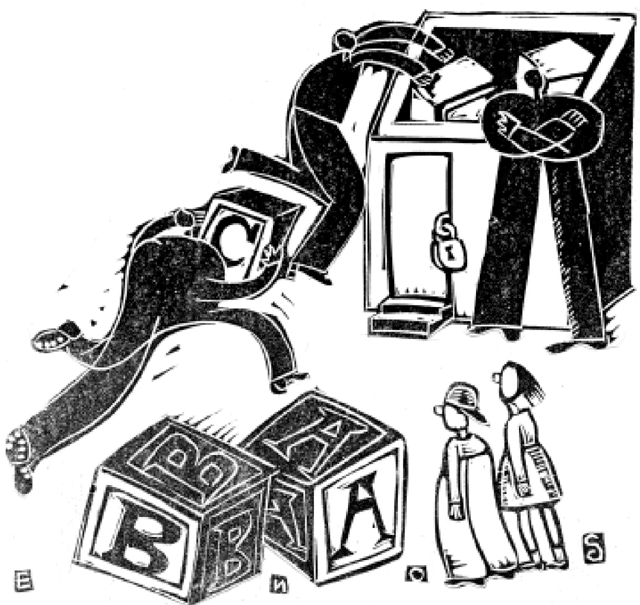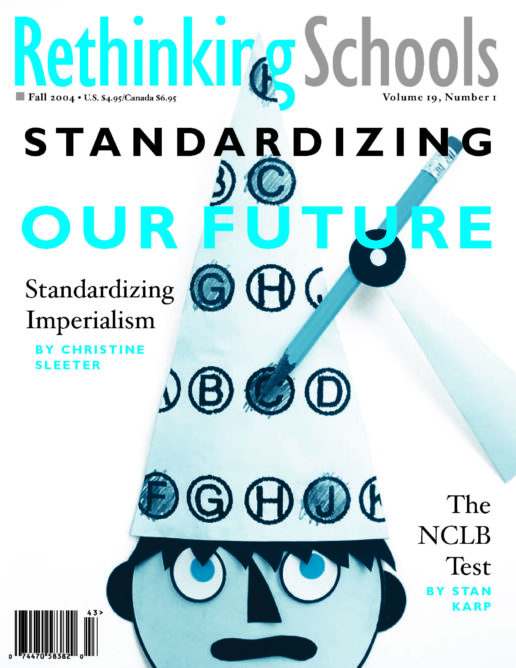Editorial: A Nation at Risk
Illustrator: Randall Enos

Over the past several years, we have seen George W. Bush and his allies solidify the power of a right-wing coalition of Christian fundamentalists, corporate free marketeers, and “preemptive strike” ideologues that currently guides U.S. domestic and foreign policy.
As educators, we are especially concerned about recent educational policies, particularly the counterproductive and misnamed No Child Left Behind act (NCLB). The legislation cynically used people’s legitimate concerns about educational inequality and academic achievement gaps to promote an agenda of narrow testing, punitive sanctions, and privatization. (Test your knowledge by taking the “NCLB Test.”
What’s at stake is not just the future of public education. We are defending the very concept of a public sector that serves the common good.
The Democrats share blame for many of these disastrous policies, including NCLB. And a Democratic administration will not guarantee progressive education policies. Regardless of who wins November’s election, we need to get off the defensive and promote policies such as equitable funding, smaller class sizes, and programs to enhance teacher quality that are essential if public schools are to fulfill their promise and provide a quality education for all regardless of race, color, nationality, or zip code.
The current administration has led a privatizing mania. There is escalating concern that NCLB will be used to label all of public education a failure, paving the way for privatization via for-profit companies and vouchers for religious schools.
James Jeffords of Vermont, a former Republican who is now an independent, has called NCLB “a back door to anything that will let the private sector take over public education, something the Republicans have wanted for years.”
Bush’s fealty to privatization and right-wing economics is unquestioned. But one should not underestimate his commitment to the religious right and its dream of universal vouchers providing public dollars for religious schools.
Bush has left it to Secretary of Education Rod Paige to take the lead in denigrating public schools while extolling religious education. As Paige said in April 2003, “All things being equal, I would prefer to have a child in a school that has a strong appreciation for Christian values where a child is taught to have a strong faith.”
Not surprisingly, from 2001 to 2003 the Department of Education granted $77.76 million toward a handful of right-wing groups dedicated to privatization and/or vouchers, according to a report last November by People for the American Way. The groups ranged from the Education Leaders Council, co-founded by Deputy Secretary of Education Eugene Hickok; to the Black Alliance for Educational Options (BAEO); to K12, the for-profit “virtual school” company founded by former drug czar and indefatigable scold William Bennett.
The Bush administration also makes little effort to hide its disdain for teacher unions, which have strong ties to Democrats. Again, Paige has taken the bulldog lead in barking out anti-union politics. Last February he branded the National Education Association (NEA) a “terrorist organization” for criticizing NCLB.
The 2.7 million-member NEA is the country’s largest union, with members in every congressional district. The American Federation of Teachers (AFT), meanwhile, has one million members. Breaking public education would further the right-wing dream of breaking the union movement.
The War and Our Students
With the death toll for U.S. troops in Iraq exceeding 1000, we cannot help but see these deaths reflected in the eyes of the students we teach. In fact, one of the first U.S. soldiers to die in the Iraq war was a former student of a Rethinking Schools editor.
When Bush led the United States into war in April 2003, millions around the world demonstrated against it. Since then, a growing body of evidence suggests the administration lied about the threat of weapons of mass destruction to justify an invasion. Rising death counts for both Iraq and the United States, prison abuse scandals, and escalating insurgencies in Iraq contribute to a growing dissatisfaction with the war.
We’ve watched our students, often students of color, deliberate about joining the military. Some of us attend funerals for students and family members of students. And we struggle to soothe the young children in our classes as they grow more fearful with each broadcast of the evening news.
The notion that aggression and war are the answer to human conflicts goes against the values we want to promote in our classrooms. From the “peace tables” in some elementary school classrooms where we encourage students to talk through disagreements to class meetings in high school where students take on issues, our practices as critical teachers center on nonviolent, positive, and proactive approaches to conflict. This task becomes even more difficult as pro-war messages continue to flood the airwaves.
The national conversation surrounding this war presents ample opportunities for classroom discussion regarding the U.S. role in the world today and in the past. As the 1971 John Kerry speech reprinted in this issue of the magazine shows, Kerry’s testimony was a moving addition to the antiwar cause. As we go to press, Kerry has begun to speak out more forcefully against the Iraq war. If he revives his antiwar past — denouncing imperial arrogance, civilian casualties, war profiteering, the betrayal of soldiers’ sacrifices, and official lies and incompetence — it will be because the antiwar movement pressures him to do so.
Whether one looks at education or the war, it’s clear that our nation is at risk. Ultimately, the progressive movement — including those working for educational equity, labor rights, reproductive freedom, and global justice — needs to push beyond defensive strategies and develop campaigns promoting social justice and peace.

